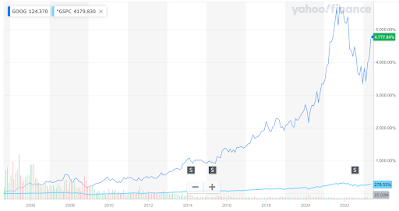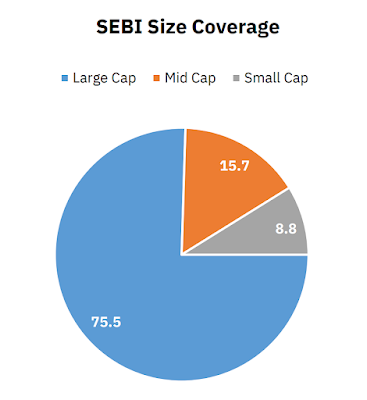I have a desire to invest in “direct equity”. That is, buying stocks directly rather than through wrappers such as mutual funds. But I have neither the skills nor the time necessary to analyse companies. So I have been thinking about ways to invest in equity without doing analysis.
But why do I want to invest in direct equity? Like most people, I am inspired by anecdotal success stories.
I received Google shares as compensation. I left those shares idle in my brokerage account for years because I was ignorant about stocks, and I was not motivated enough to learn about them. This resulted in an unimaginable growth. Now that I know better about the danger of holding US stocks, I want to sell my Google shares and buy diversified assets instead. At the same time, I am afraid that I’ll lose the rapid growth I got through GOOG. I want to maintain a similar growth by holding some companies directly.
 |
| GOOG has grown significantly faster than S&P 500 (source) |
There is also the lure of dividend income during retirement, but I recently decided that that’s not worth pursuing. (See Are equity dividends a good source of retirement income?)
I have so far thought about the following stock picking strategies.
Strategy 1: just buy popular stocks
Just buy the winners of the Indian share market. The likes of HDFC Bank, Asian Pains, Titan, etc. The risk is that you will not have any idea why you are buying a company, how much money you need to deploy in each of these companies, when to sell, how much to sell, etc.
This is possibly the worst option of all. You are essentially betting blindly, and hoping that it’ll all turn out fine. As Pattu of freefincal.com often says, our money deserves more respect than this.
Strategy 2: invest based on other people’s advice
Stock advisory services come in different shapes and forms. But essentially, the advisor tells you what to buy, what to sell, and what you can continue to hold. Different advisory services give you differing levels of detail on why they recommend what they recommend. Smallcase is a popular service in this category. You get advice that is integrated with your broker so that you can do the recommended trades with a click of a button.
While this sounds attractive on paper, you are essentially investing in a high cost mutual fund that lets you retain some control. You more or less blindly execute someone else’s decision. It is true that you can override the recommendation, but how many will do that in reality, with conviction (as opposed to simply rolling the dice)? If we are capable enough to override the recommendations, do we even need an advisory service?
Strategy 3: coffee can investing
You make a concentrated stock portfolio, and you just keep buying. You never sell. You don’t need to monitor your companies because you have already decided that you will never sell.
Coffee can investing is popular, so the idea must sound reasonable to many people. However, it sounds like a half-baked approach to me. We enter the equity market very much like how Abhimanyu entered the chakravyuha. If there is a Yes Bank in my portfolio, am I supposed to sit down patiently hoping that some day the share will make up for all the lost time?
My main concern with coffee can investing is that it’s built on the premise that we are infallible stock pickers. This strategy does not have a way to detect errors or course correct. Such a strategy fails to instill confidence in me, so this one gets a no-go from me.
My current stance
What is my goal? I want to invest in a concentrated stock portfolio to earn market-beating return. The simplest avenue for that is active mutual funds. Rather than paying for stock tips and advice, you pay for advice and management. Because the invested capital is usually thousands of crores, the fund managers can hire expensive advisors. Economies of scale reduce the trading costs. Rebalancing is a tax-free event (at least for now). You give up some control, but you get all these benefits for a fraction of the cost. This sounds to me like a better way than trying to do it yourself.







